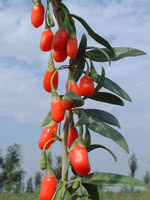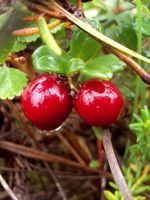Mon-Fri 9am - 5pm Mountain time
Goji Berry vs Small Cranberry
Lycium barbarum
Vaccinium oxycoccos
NOT AVAILABLE THIS SEASON - MIGHT RETURN
CUSTOM GROW
Goji Berry is a woody, deciduous perennial known for its hearty, bright orange-red berries. It typically produces light lavender flowers from June through September, with fruit maturation taking place between August and October.
Goji Berry berries are delicious, nutrient rich, high in antioxidants, and are often called a super fruit. Many describe their flavour as being like a tart cherry tomato.
Small Cranberry is a native evergreen groundcover found in bogs, fens, and wet meadows. It produces delicate pink flowers that attract a variety of pollinators, including bees, and it serves as both a nectar source and host plant for the Bog Fritillary (Boloria eunomia) butterfly. By late summer, the plant bears deep red berries that are eaten by both wildlife and people. With their high pectin content, the berries are well-suited for making jams and jellies.
Often creeping among sphagnum moss, Small Cranberry thrives in cold, acidic, and nutrient-poor soils (pH 2.9–4.7), making it well adapted to northern wetland environments. With its woody stems, it is technically classified as a shrub and often described as a subshrub or dwarf shrub. It is also valuable for wetland restoration and naturalisation projects.
Note: We use Small Cranberry for Vaccinium oxycoccos. This species is also known by many other common names, including Bog Cranberry, Small Bog Cranberry, and others. Please confirm the scientific name to ensure you are ordering the correct plant.

